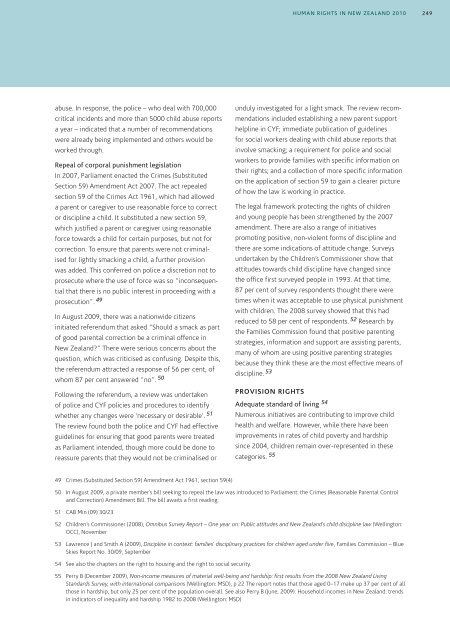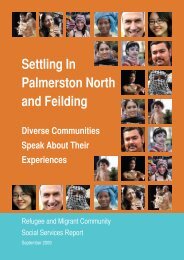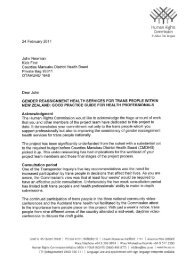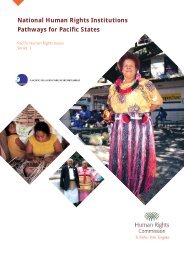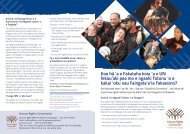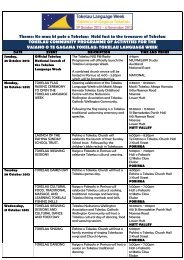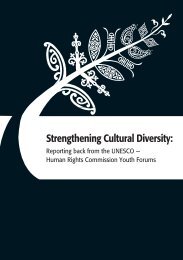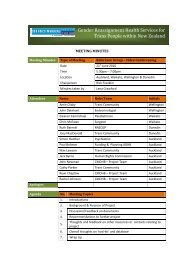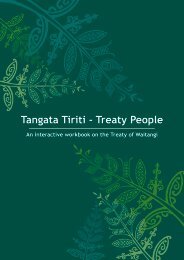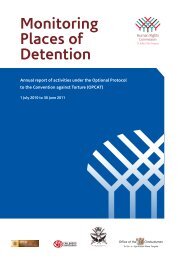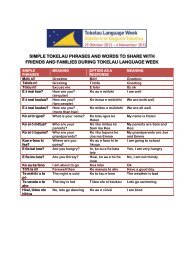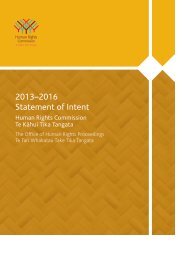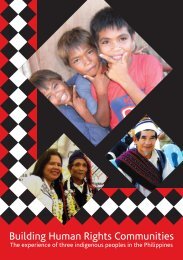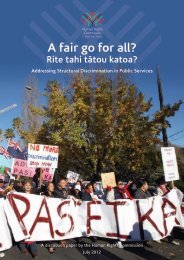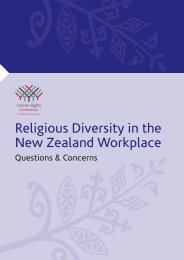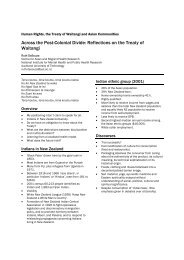16. Rights of Children and Young People - Human Rights Commission
16. Rights of Children and Young People - Human Rights Commission
16. Rights of Children and Young People - Human Rights Commission
You also want an ePaper? Increase the reach of your titles
YUMPU automatically turns print PDFs into web optimized ePapers that Google loves.
HUMAN RIGHTS IN NEW ZEALAND 2010 249<br />
abuse. In response, the police – who deal with 700,000<br />
critical incidents <strong>and</strong> more than 5000 child abuse reports<br />
a year – indicated that a number <strong>of</strong> recommendations<br />
were already being implemented <strong>and</strong> others would be<br />
worked through.<br />
Repeal <strong>of</strong> corporal punishment legislation<br />
In 2007, Parliament enacted the Crimes (Substituted<br />
Section 59) Amendment Act 2007. The act repealed<br />
section 59 <strong>of</strong> the Crimes Act 1961, which had allowed<br />
a parent or caregiver to use reasonable force to correct<br />
or discipline a child. It substituted a new section 59,<br />
which justified a parent or caregiver using reasonable<br />
force towards a child for certain purposes, but not for<br />
correction. To ensure that parents were not criminalised<br />
for lightly smacking a child, a further provision<br />
was added. This conferred on police a discretion not to<br />
prosecute where the use <strong>of</strong> force was so “inconsequential<br />
that there is no public interest in proceeding with a<br />
prosecution”. 49<br />
In August 2009, there was a nationwide citizens<br />
initiated referendum that asked “Should a smack as part<br />
<strong>of</strong> good parental correction be a criminal <strong>of</strong>fence in<br />
New Zeal<strong>and</strong>” There were serious concerns about the<br />
question, which was criticised as confusing. Despite this,<br />
the referendum attracted a response <strong>of</strong> 56 per cent, <strong>of</strong><br />
whom 87 per cent answered “no”. 50<br />
Following the referendum, a review was undertaken<br />
<strong>of</strong> police <strong>and</strong> CYF policies <strong>and</strong> procedures to identify<br />
whether any changes were ‘necessary or desirable’. 51<br />
The review found both the police <strong>and</strong> CYF had effective<br />
guidelines for ensuring that good parents were treated<br />
as Parliament intended, though more could be done to<br />
reassure parents that they would not be criminalised or<br />
unduly investigated for a light smack. The review recommendations<br />
included establishing a new parent support<br />
helpline in CYF; immediate publication <strong>of</strong> guidelines<br />
for social workers dealing with child abuse reports that<br />
involve smacking; a requirement for police <strong>and</strong> social<br />
workers to provide families with specific information on<br />
their rights; <strong>and</strong> a collection <strong>of</strong> more specific information<br />
on the application <strong>of</strong> section 59 to gain a clearer picture<br />
<strong>of</strong> how the law is working in practice.<br />
The legal framework protecting the rights <strong>of</strong> children<br />
<strong>and</strong> young people has been strengthened by the 2007<br />
amendment. There are also a range <strong>of</strong> initiatives<br />
promoting positive, non-violent forms <strong>of</strong> discipline <strong>and</strong><br />
there are some indications <strong>of</strong> attitude change. Surveys<br />
undertaken by the <strong>Children</strong>’s <strong>Commission</strong>er show that<br />
attitudes towards child discipline have changed since<br />
the <strong>of</strong>fice first surveyed people in 1993. At that time,<br />
87 per cent <strong>of</strong> survey respondents thought there were<br />
times when it was acceptable to use physical punishment<br />
with children. The 2008 survey showed that this had<br />
reduced to 58 per cent <strong>of</strong> respondents. 52 Research by<br />
the Families <strong>Commission</strong> found that positive parenting<br />
strategies, information <strong>and</strong> support are assisting parents,<br />
many <strong>of</strong> whom are using positive parenting strategies<br />
because they think these are the most effective means <strong>of</strong><br />
discipline. 53<br />
PROVISION RIGHTS<br />
Adequate st<strong>and</strong>ard <strong>of</strong> living 54<br />
Numerous initiatives are contributing to improve child<br />
health <strong>and</strong> welfare. However, while there have been<br />
improvements in rates <strong>of</strong> child poverty <strong>and</strong> hardship<br />
since 2004, children remain over-represented in these<br />
categories. 55<br />
49 Crimes (Substituted Section 59) Amendment Act 1961, section 59(4)<br />
50 In August 2009, a private member’s bill seeking to repeal the law was introduced to Parliament: the Crimes (Reasonable Parental Control<br />
<strong>and</strong> Correction) Amendment Bill. The bill awaits a first reading.<br />
51 CAB Min (09) 30/23<br />
52 <strong>Children</strong>’s <strong>Commission</strong>er (2008), Omnibus Survey Report – One year on: Public attitudes <strong>and</strong> New Zeal<strong>and</strong>’s child discipline law (Wellington:<br />
OCC), November<br />
53 Lawrence J <strong>and</strong> Smith A (2009), Discipline in context: families’ disciplinary practices for children aged under five, Families <strong>Commission</strong> – Blue<br />
Skies Report No. 30/09, September<br />
54 See also the chapters on the right to housing <strong>and</strong> the right to social security.<br />
55 Perry B (December 2009), Non-income measures <strong>of</strong> material well-being <strong>and</strong> hardship: first results from the 2008 New Zeal<strong>and</strong> Living<br />
St<strong>and</strong>ards Survey, with international comparisons (Wellington: MSD), p 22 The report notes that those aged 0–17 make up 37 per cent <strong>of</strong> all<br />
those in hardship, but only 25 per cent <strong>of</strong> the population overall. See also Perry B (June, 2009). Household incomes in New Zeal<strong>and</strong>: trends<br />
in indicators <strong>of</strong> inequality <strong>and</strong> hardship 1982 to 2008 (Wellington: MSD)


